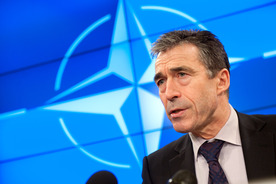By Libya Herald staff.
Benghazi/Tripoli, 22 October 2013:
Ismail Salabi, one of the Benghazi’s main Islamist leaders and a commander of the Libya . . .[restrict]Shield No. 1 batallion, and Khaled Buleghrayeb, a prominent figure in the federalist movement, met yesterday in an attempt to reduce tension and build bridges following the backlash against the Islamists in the city after Friday’s assassination of Libya military police chief Ahmed Mustafa Al-Barghathi.
Buleghrayeb, a member of the Aguri tribe, one of the largest in Libya and which includes the Barghathi, is linked to the more tribally-based group of federalists centred around the Cyrenaica Transitional Council’s symbolic leader, Ahmed Zubair Senussi. He and they were side-lined on 17 August when a younger group met in Ras Lanuf took over the movement and selected Ibrahim Jadhran as leader of its newly formed Political Bureau. He is now holding Libya to ransom by blockaging the eastern oil terminals.
Charismatic, Buleghrayeb had spoken out against the militants after Barghathi’s assassination although, according to both federalists and Islamists, he did not take part in the attack on the family home of Wissam Ben Hamid later that night.
The move to build bridges appears to have been initiated from Salabi’s side. According to a well-placed source close to the Libya Shield commander, one his followers, Ali Sweidan, who is also a member of the Auguri tribe, contacted Buleghrayeb to attempt a reconciliation. It resulted in Buleghrayeb being invited to Ismail Salabi’s home. Four nights ago, the source said, it had been surrounded with several hundred guards to protect it when, after attacking Ben Hamid’s home, Barghathi forces headed for the houses of other Islamist leaders in the city.
According to the source, there were frank discussions between the two men, during which Salabi assured Buleghrayeb that he had not been involved in Barghathi’s murder or in any of the assassinations and attacks in Benghazi. The meeting ended up with the two resolving their own differences and promising to try and solve the problems with Ben Hamid, the source divulged.
Federalists have a somewhat different take on the meeting.
“After the assassination of Ahmed Barghathi, the response of the Islamists was surprise as to how few people in Benghazi supported them,” said a source close to the older group of federalists. “That really scared them. With the numbers on the street, they knew that they would not be able to confront the tribes.”
Tensions were still running high in Benghazi, the federalist source said, disclosing that there had been an attack yesterday on a Barghathi camp in Benghazi. “It’s going to be tit for tat,” he predicted, expressing little belief that attempts to build bridges between the federalists and the Islamists would last.
Salabi had told Buleghrayeb, the source claimed, that much of the blame for the city’s troubles lay with the government and Congress. If it had implemented Sharia law, Salabi was reported to have said, there would not have been any problems. [/restrict]








